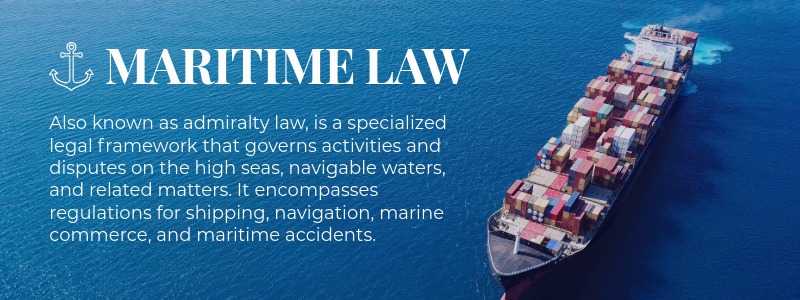
Maritime law, also known as admiralty law, is a specialized legal framework that governs activities and disputes on the high seas, navigable waters, and related matters. It encompasses regulations for shipping, navigation, marine commerce, and maritime accidents. Maritime law ensures the proper conduct of individuals and organizations operating in marine environments while addressing issues such as shipping contracts, maritime injuries, and environmental protection.
The United States Constitution grants authority to the federal courts to exercise admiralty jurisdiction since maritime suits often involve questions of national importance that concern commerce, international relations, and foreign citizen rights.
Get a Free Consultation Today!
Typically, admiralty jurisdiction covers cases where the claim arises from an accident on the navigable waters of the United States and involves maritime commerce.
Admiralty jurisdiction also covers contracts concerning “the navigation, business or commerce of the sea,” and crimes committed on the high seas against a US vessel or a US citizen.
Furthermore, the United States Supreme Court has held admiralty jurisdiction is not limited to cases involving commercial vessels.
Simply put, accidents involving privately owned boats on navigable waters can be brought in admiralty courts, even if the boat was only used for a fun day trip with family and friends.
Other laws apply in cases involving longshoremen, stevedores, and harbor workers, which you can read about in our post: Two Powerful Remedies for Injured Longshoremen and Harbor Workers.
A court has exclusive jurisdiction over a claim if it has the power to hear the claim to the exclusion of all other courts. Federal courts have exclusive original jurisdiction of all civil cases of admiralty and maritime jurisdiction, but individuals do not have to bring maritime cases in federal courts.
Long ago, Congress issued the Judiciary Act of 1789 which gave state courts concurrent jurisdiction (meaning that a case can be brought in more than one court) to hear most types of admiralty actions as long as there is a remedy available under the common law.
In other words, state courts can hear maritime cases as long as the state court is capable of granting some relief to the parties that they wouldn’t necessarily have access to in the federal court system.
Characteristically, cases normally brought in state courts instead of federal courts are ones that involve tort actions or where a state court can get personal jurisdiction over the defendant.
There are a few types of admiralty claims that a federal court has exclusive jurisdiction over and must hear, including the enforcement of a maritime lien, foreclosure on a preferred ship mortgage, limitation of the vessel owner’s liability, any proceeding where the ship itself is being sued (in rem proceeding), and maritime suits against the government.
It is the choice of the parties to bring their case in state or federal courts. This choice is an important one because the parties may have different or more favorable rights under federal maritime law than they would have under state law or vice versa. When a case is brought in state court, the court must apply substantive federal law and state procedural law.
This rule ensures that federal maritime laws govern all maritime cases but allow the states to hear maritime cases based on their own procedures and common law. This distinction is important because in many respects federal admiralty law differs from state law.
Possibly the most critical difference between maritime law and common law courts is that admiralty judges only apply general maritime law and conduct trials without juries.
For cases involving maritime law, such as those involving an offshore injury, it is important to find a lawyer who understands the intricacies of this complex area of law.
The Houston maritime injury lawyers at Armstrong Lee & Baker LLP are well-versed in the ins and outs of the laws that apply in maritime cases.
History of Maritime Law
Maritime law has ancient roots, tracing back to the early trading civilizations of the Mediterranean. Over time, it has evolved into a complex body of laws that are both national and international in scope. Today, maritime law includes various statutes, conventions, and treaties that regulate activities on the water. In the United States, maritime law is primarily federal, although state laws can also play a role in some instances.
Critical Components of Maritime Law
Several key components make up maritime law, each addressing different aspects of maritime activities and issues:
- The Jones Act: One of the most significant statutes within US maritime law is the Jones Act. It provides protections for seamen hurt in the course of their employment and allows injured seamen to sue their employers for damages resulting from negligence. This act is vital for ensuring maritime workers can seek compensation for injuries sustained at sea.
- Maintenance and cure: This doctrine requires employers to provide for an injured seaman’s basic living expenses and medical care until they reach maximum medical improvement. Maintenance covers daily living expenses, while cure covers medical expenses. This obligation exists regardless of who was at fault for the injury.
- Longshore and Harbor Workers’ Compensation Act (LHWCA): This federal maritime law provides workers’ compensation to maritime workers who are not seamen, such as longshoremen, harbor workers, and other maritime employees. The LHWCA offers benefits for medical care and rehabilitation services and compensation for lost wages due to injury.
Compensation Under Maritime Claims
Maritime law provides a framework for determining compensation in cases of maritime accidents. Whether you’re dealing with a personal injury, property damage, or a wrongful death, understanding how compensation works is essential in protecting your rights.
When it comes to maritime claims, compensation can cover a range of damages, including medical expenses, lost wages, pain and suffering, and property loss. The amount of compensation you may be entitled to will depend on various factors, such as the severity of the injury, the impact on your earning capacity, and the extent of the property damage.
Why You Need a Maritime Injury Lawyer
A maritime injury lawyer provides crucial assistance to those injured at sea. Their expertise is essential in handling legal challenges and ensuring injured maritime workers receive the compensation they are entitled to.
Maritime injury lawyers assist clients in several ways:
- Investigating claims: They thoroughly investigate the circumstances of an injury, gathering evidence and interviewing witnesses to build a strong case.
- Understanding the Jones Act and other statutes: Lawyers help clients understand and utilize the protections offered by the Jones Act, LHWCA, and other relevant laws.
- Negotiating settlements: Attorneys negotiate with employers and insurance companies to secure fair settlements for their clients.
- Litigating cases: When negotiations fail, skilled maritime injury lawyers represent their clients in court, advocating for their rights and seeking just compensation.
Our Maritime Lawyers are Ready to Help
Maritime law is complex, encompassing many issues related to activities on navigable waters. Consulting a maritime injury lawyer is critical to handling all potential legal complications and helping you secure the benefits you deserve. You can schedule a free case evaluation by using our online form or calling (832) 402-6637.
severe injuries demands serious results
If you or someone you know has been injured in an offshore incident and needs to speak to an experienced maritime attorney, contact 832-402-6637 for a consultation regarding your case.
